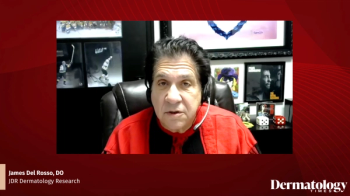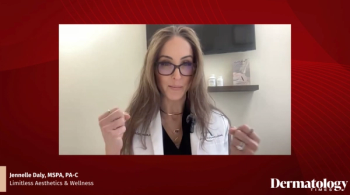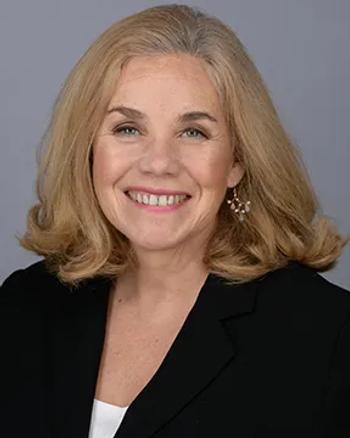
AAD, Janssen, and Kenvue Partner to Mentor Next Generation of Dermatologists
Daphne Chan, PhD, MHEcon, discusses the Pathways program, a partnership between the AAD, Janssen, and Kenvue to mentor young, aspiring dermatology providers.
Last year, the
Recently, high school and college- age students from underrepresented communities converged in Washington, DC, for a 5-day Pathways experience with mentorship at the heart of the program.
Daphne Chan, PhD, MHEcon, head of the Dermatology Medical Affairs unit at Janssen Immunology US, spoke with Dermatology Times® to discuss the significance of the Pathways program, early mentorship in dermatology, and hope for a more inclusive and representative industry.
Transcript
Daphne Chan, PhD, MHEcon: My name is Daphne Chan. I am currently the head of the Dermatology Medical Affairs unit with Janssen Immunology US, and I lead a group of dermatologists, providers, clinicians, and research scientists who are dedicated to contributing to post-approval clinical research as well as medical education to help further advance in important clinical practice information as well as product knowledge to help patients and providers to make decisions that are important to their care.
How we're connected to the Pathways program is that the Pathways program is an initiative joint force by Janssen, Kenvue (formerly Johnson and Johnson Consumer Health), as well as the American Academy of Dermatology, and our goal is really to work together towards increasing diversity in the dermatology medical workforce. So the program has launched, we're in the middle of our second year, so lots happening and a lot still to do.
Dermatology Times: What is the Pathways program, and what is its mission and goal?
Chan: The Pathways program has a goal of increasing diverse representation. So specifically, as we may know, or we may not know, we do suffer, just like other therapeutic areas, that there is tremendous under representation of minorities in the medical workforce. So the Pathways programs has a mandate to increase diverse representation from the Black, Latino and Indigenous communities to enroll more physicians who are underrepresented minorities currently in the dermatology space.
Our goal is to increase diverse representation by 50% in 5 years, so by 2027. Definitely a noble goal. It's not going to be easy, but that's why we're working on it.
Dermatology Times: What is the importance of early mentorship, particularly in a young cohort?
Chan: As we all know, we don't land in our professions by just thinking about it and then magically land on it tomorrow Especially for entering a medical profession or into the health care profession, there is a lot of prerequisite training and schooling as well as a pretty full-fledged extra curriculum of activities that students do need to embark on a pretty intense journey before they can actually make those decisions.
So in our minds, we think that early engagement of students even as young as high school, by opening their doors and sharing insights to them in terms of what may be of interest to them, suggest: 'Is dermatology a potential and space of interest to you?' And then for students coming from diverse communities, and some of which may be a little bit less exposed to such opportunities and offerings, it's even more important to introduce these opportunities and possibilities to them. Plant those seeds early so they actually know that there are these 15 steps I have to take before I can even ask the question of, 'Can I do this? Do I want to do this? And what's next?' So I think having developed that insight from ourselves and with the academy, and with really a big group of dermatology providers who take strong interest and passion in developing new pipeline of talent for dermatology, it's really great and it starts early. Nothing better than that.
Dermatology Times: How can dermatologists support early mentorship in their work?
Chan: There are many different ways to offer their support, if you're a dermatology provider who is interested. First, most dermatology providers are members of the academy, so can work directly with the academy to offer your support in taking part in Pathways-related initiatives. So that could be taking part in skills workshops, doing demonstrations, giving career talks, offering direct mentorship opportunities in your own office.
These are probably some of the easy steps to take, and then additional steps that each of us can take, and this may be applicable as well to the providers who have their own practice or who are part of group practices, who do have the infrastructure to take on students for an experience journey. I know a lot of providers actually offer that opportunity to their local communities, and I've heard that some providers actually take in students from elementary school, not even in high school, just to show them: This is what a dermatology practice looks like. This is what we do. This is what it means by seeing patients. These are the procedures that we actually perform on patients on a daily basis. What is dermatology? Who do we take care of? What conditions do we take care of? So there are so many different facets of help, and it really depends on the providers' interest and their bandwidth. There's only so much that you can do in a busy day; practices are very busy. But I hope I've offered a variety of different opportunities for providers who may be interested in taking part, and if everyone just takes one little step, I think we would have all contributed in a big way and have made impact.
Dermatology Times: What is the impact of the Pathways program in dermatology, diversity, and mentorship?
Chan: We're in the middle of our second year of this partnership with Kenvue and with the American Academy. So over the past 1 and a half years, I know that we have partnered, and the Academy has been leading the efforts, in structuring mentorship programs, skills, training and career planning, workshop, travel grants, internships, and fellowships. And there's also an annual symposium for medical students to engage them, to spark their interest in maybe: You want to consider a residency in dermatology. So that's a direct impact on the goal of increasing diverse representation for dermatology residents in 5 years. And then all the seeds that are planted in the younger cohorts as they have to step through their journey.
Most specifically, if I can speak to the Pathways program that we just conducted in DC last weekend, it was a very structured 5-days experience, journey, involving approximately 30 diverse students, high school and college, across the country; some of them came from far [away] and with their parents who also take very keen interest in helping them find their way. Over the 5 days, the students were able to have hands-on experience seeing how some typical procedures were demonstrated. They were taught lessons and given tips on how to successfully prepare for, to apply to, medical school, and then the next steps to take to if they're interested in taking dermatology as a specialty. And then also broader student outreach and insight sharing in having panels, discussions, about what you need to do if you're even interested in the periphery of the profession, including the greater community and even industry, for which I was grateful to be part of those panels. And then what we also did was we actually have live demonstrations with the Janssen team that I was part of, and also the Kenvue team. For the Janssen team, we actually demonstrated how we use calorimetry to determine skin types, because it's actually not widely-known: How do you measure skin types? How do you assess skin types? Why do we care about skin types? And what are some issues that have been related to not understanding this and causing some barriers in the provision of therapy as well as conduct of clinical research? And then we also shared with the students our current progress at Janssen, how we've conducted the first ever 100%-focused on skin color patient study in psoriasis. So you can see that it's pretty much a pull-through package and trying our best to open all the doors possible to the students so that they can see, and garner their interest, that there are many possibilities. There's just not 1 path. There are many paths, and here are all the possible ways that you may take an interest and how you may want to pursue thinking about it further.
Dermatology Times: What should dermatology providers know about the Pathways program?
Chan: I think continue to spread the word. As I said earlier, developing the next generation of talent is not easy. What is actually an advantage that we have right now is that [in] this generation, the kids these days are much better set up, I find, they are more exposed thanks to technology and social media, so they see more than we used to in the past generations, and so opportunities are more accessible, or at least the awareness is more there.
So as dermatology providers or others who are working currently in dermatology who wants to help give a hand to inviting students, even bring them closer to these opportunities, do take part in the Academy list of offerings and partnership offerings. Do consider what you can do as individual group or group practice providers: It's just opening your door, do some community outreach.
And then for us in the industry, doing the same. We host a lot of interns from college to postgraduate; we just initiated a dermatology resident internship program. My passion in sharing that commitment with all of us in dermatology: Just expand the word, pass the word, and give.
[This transcript has been edited for clarity.]
Newsletter
Like what you’re reading? Subscribe to Dermatology Times for weekly updates on therapies, innovations, and real-world practice tips.










